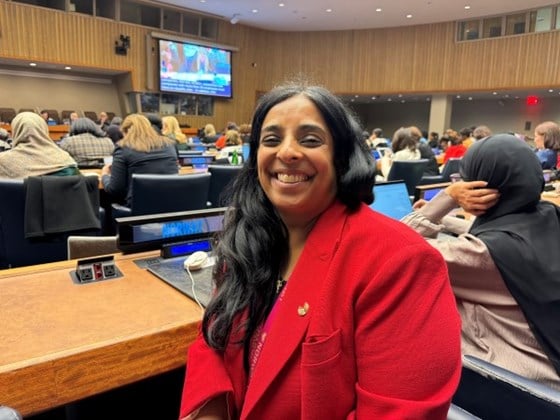Speech at the sixty-eight session of the Commission on the Status of Women
Tale/innlegg | Dato: 14.03.2024 | Kultur- og likestillingsdepartementet
Av: Kultur- og likestillingsminister Lubna Jaffery (UN's Headquarter, New York)
The Minister of Culture and Equality Lubna Jaffery's speech at The sixty-eight session of the Commission on the Status of Women (CSW68).

Chair,
It is about time we ensure that no woman or girl is left behind.
We, the member states of the United Nations, have agreed to end poverty and to achieve gender equality and empower all women and girls by 2030. Despite this, we are far from reaching our goals.
Women suffer from higher levels of poverty. Indigenous and ethnic minority women, and women with disabilities, are the furthest behind.
Wars and conflicts around the world impact the lives of millions of girls and women. Both in Russia’s war against Ukraine and in the war in Gaza, women and girls are facing unspeakable violence, including conflict-related sexual violence.
We call for the protection, and full, equal, and meaningful participation, of women in all processes related to war and peace.
Poverty serves as a root cause, leading to women and children being vulnerable to trafficking and to exploitation in prostitution.
The global democratic backsliding is worrying. We are deeply concerned by the seemingly well organised pushback against gender equality and sexual and reproductive health and rights. This happens within states as well as in multilateral fora.
The best safeguard against violence, conflict, and war lies in democratic governments respecting fundamental freedoms and human rights.
Civil society organisations and trade unions play crucial roles in fostering welfare, eliminating poverty, and promoting equality. It is imperative that we support them.
Women’s economic and political participation is fundamental to economic growth, sustainable development, and prosperous, peaceful societies.
Chair,
Securing universal access to quality education for all children is key to eradicating poverty.
Educating girls is an urgently needed and smart investment, for girls and societies. Education increases women’s employment, political participation, economic independence, and tax revenues for states. Education reduces child-, early- and forced marriages, early pregnancies and sexual and gender-based violence.
Religion and so-called traditional values are used as an excuse to deprive girls and women of their rights.
Legal restrictions on abortion do not result in fewer abortions – they just make abortions less safe and put women’s lives at risk.
Together, we must put an end to child-, early- and forced marriages. And we must put an end to unsafe abortions.
Every girl and woman should be able to decide freely over her own body and life.
We know what it takes to make policy choices that accelerate progress towards ending poverty and achieving inclusive, sustainable development for all.
We urgently need to increase our efforts to solve the climate and inequality crises.
These crises are interlinked and exacerbate each other and must therefore be addressed simultaneously.
We must mobilize far larger investments than we have until now.
We must fight illicit financial flows that drain vital tax revenues and reduce the fiscal space for investments that address the challenges faced by women and girls living in poverty.
We must also enhance coordination in global tax matters and ensure that women and girls benefit from increased tax revenues.
The international community cannot resolve today’s global challenges without the full, equal, and meaningful participation of women.
The importance of strengthening gender equality must therefore be underlined and should be mainstreamed throughout all UN documents, including all chapters of the Pact for the Future.
It is about time we ensure that no woman or girl is left behind.
Thank you, chair.